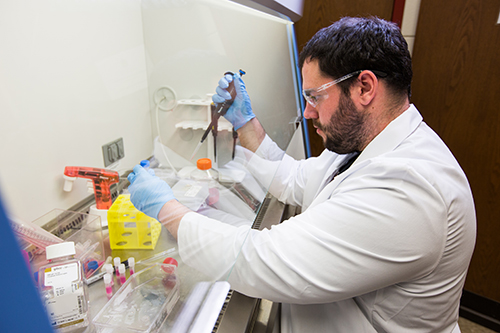
Jacob Brown originally considered going into medicine but then he realized studying the cause of disease was really what intrigued him. Now well into a doctoral program at the University of Arkansas, Brown is first author of a new peer-reviewed article in Acta Physiologica.
Brown's advisor, Nicholas Greene, described the journal as one of the most prestigious in the field of physiology since it was established in 1889. Brown is pursuing a doctorate in cell and molecular biology and works in Greene's Integrative Muscle Metabolism Laboratory in the Health, Physical Education and Recreation Building on campus. Greene is an assistant professor of exercise science in the College of Education and Health Professions.
After earning a bachelor's degree from Missouri Southern State University, Brown researched doctoral programs and found that Greene's lab fit with his interests. Students and faculty in Greene's lab examine the regulation of metabolic functions in skeletal muscle in disease conditions and the potential corrective effects of exercise and lifestyle physical activity on skeletal muscle metabolic impairments.
Since December, three doctoral students working in the lab have had papers published with them as first author.
In the Acta Physiologica article, Brown describes his study that examined a protein called PGC-1α4, a gene that may contribute to muscle-wasting diseases including cancer, HIV and diabetes. Scientists have been studying the possible effects of raising the protein's levels to help prevent muscle mass loss caused by disease, prolonged inactivity and aging, but according to Brown's article, there is limited understanding of the regulation of its expression and role in many pathophysiologic conditions.
Brown's research introduced a signaling mechanism that regulates the expression of PGC-1α4 and examined the response to stimuli associated with altered muscle mass. His results suggested a novel mechanism suppressing the PGC-1α4 expression that may limit the muscle's ability to add protein, critical for maintenance of mass and strength.
Brown is in the third year of the cell and molecular biology doctoral program and is interested in continuing to conduct research at the university level once he graduates.
Topics
Contacts
Heidi S. Wells, director of communications
College of Education and Health Professions
479-575-3138,